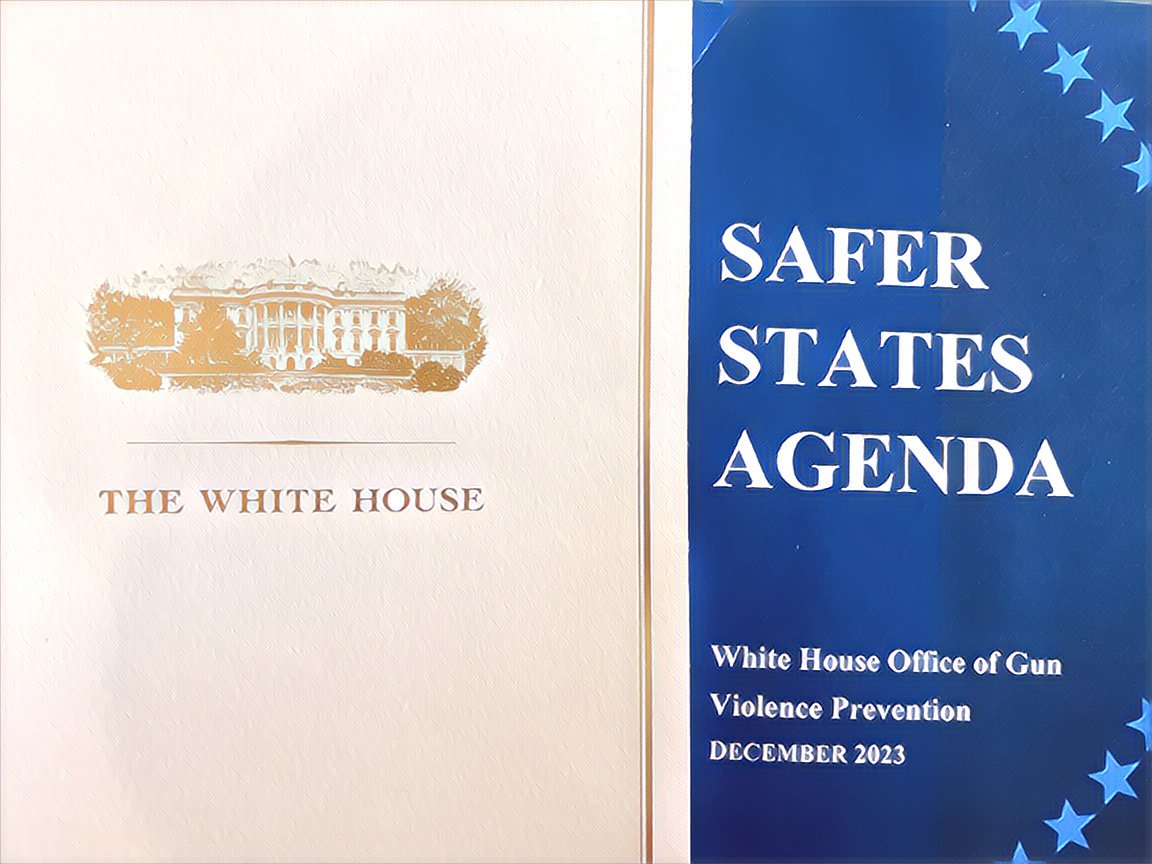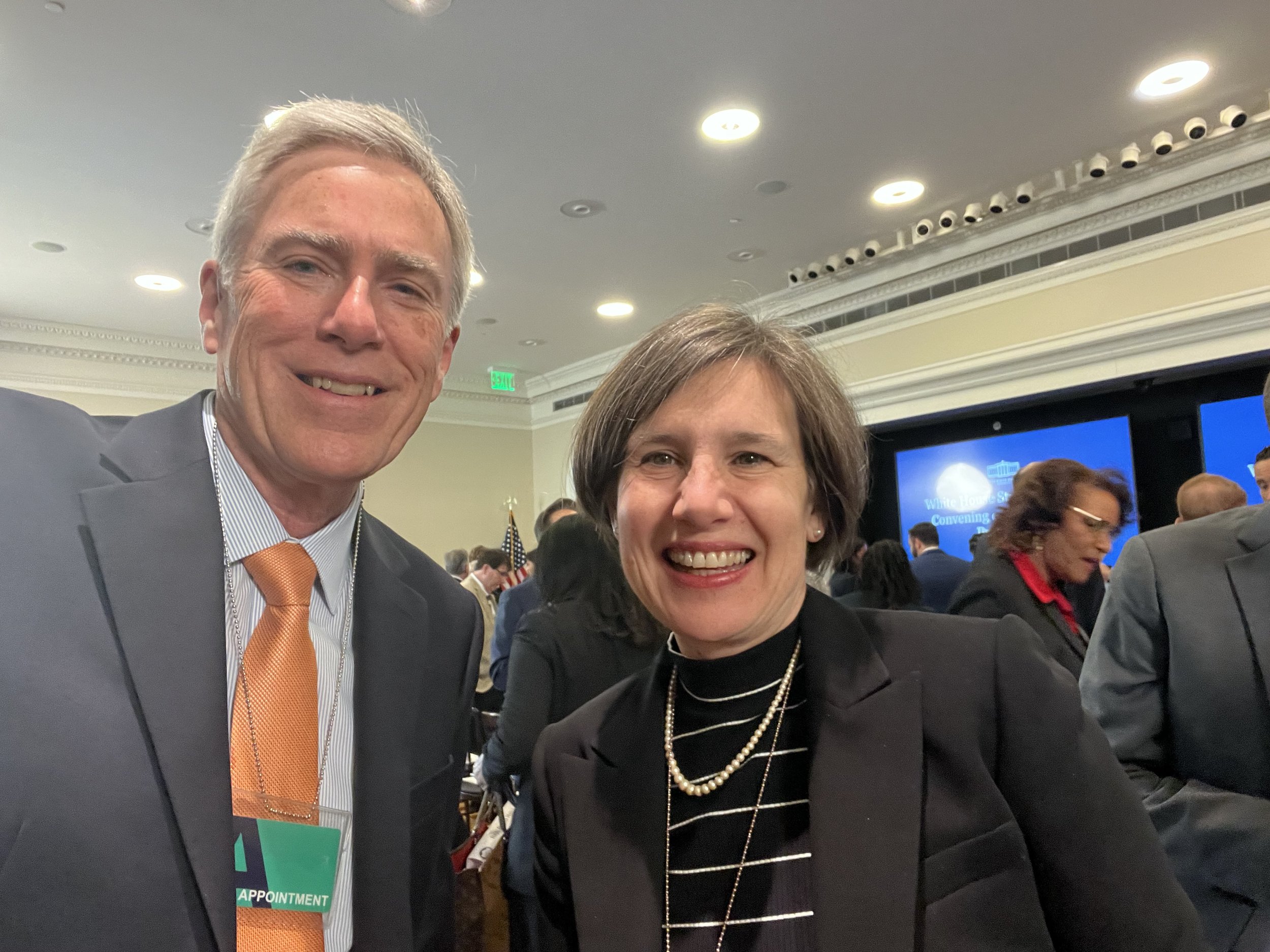Finally…Meaningful Help from Washington to Reduce Gun Violence
It’s not unusual for an elected official to say in a social media post that he or she is “proud” to be at an event. But it’s definitely a bit unusual for one say they were humbled and inspired by one.
Count me in as officially humbled and inspired by what I saw and heard at the first-ever convening of state legislators by the White House Office of Gun Violence Prevention.
Along with my colleague Rep. Alexis Simpson, I was one of over 100 legislators from 39 states to be in the room for the launch of he Biden Administration’s Safer States Agenda. (See local coverage).
Until now, legislators working at the state level to reduce the risk of gun violence have largely been supported by wonderful advocacy organizations like Granite State Progress, Everytown for Gun Safety, and Moms Demand Action. But help from the federal government in support of this work has been sporadic, uncoordinated, poorly funded, and largely missing in action. As a result, efforts of legislators to reduce the risk of gun violence in states like New Hampshire, and to respond with meaningful legislation after tragedies occur, have too often lacked the sort of coordination and focus needed to score victories in the face of overwhelming opposition by gun rights groups and 99.9% of GOP elected officials.
The Safer States Agenda is all about helping states like New Hampshire to be more successful when it comes to producing the kind of legislative wins that can reduce the risk of gun violence before tragedies happen. By serving as a clearing house for best practices and model legislation, the new Office of Gun Violence Prevention will give legislators like me a head start not only when it comes to proactively taking steps to prevent gun violence, but also should the day come when there is a need to respond quickly and decisively with legislation when the unimaginable occurs.
What Does the Safer States Agenda Include?
Among the action steps the Safer States Agenda calls for are:
Establishment State Offices of Gun Violence Prevention to:
Coordinate across state agencies and with local and federal governments;
Build gun violence data collection and analysis capacity;
Develop and implement comprehensive strategies for addressing various types of gun violence; and
Develop and implement a state plan to prevent targeted violence and effectively respond to incidents of mass shootings and surges in other forms of gun violence.
While these offices would be especially useful in larger states, adding one would also add real value in smaller states like New Hampshire—especially when it comes to data collection and strategy.
Investing in Evidence-Informed Solutions to Prevent and Respond to Gun Violence. A highlight of another key set of initiatives is providing increased support for states trying to enact extreme risk protection orders to stop people whose actions and possession of firearms pose a real threat to themselves and to others. Others include more funding for crime gun data gathering and community violence intervention programs.
Strengthening Support for Survivors and Victims of Gun Violence. Action steps include funding Gun Violence Trauma Recovery Centers in communities where gun violence most frequently occurs and developing response strategies and having resources ready to deploy for communities where tragedies occur. Worth noting is that only 5 weeks after being established by President Biden, the Office of Gun Violence put boots on the ground in Lewiston, Maine after a mass shooting that left 18 people dead and 13 gravely wounded. The Office worked with state officials in Maine to set up a family and victim assistance center, helped small businesses affected by the shooting and the shelter-in-place order to secure loans to cover their losses, and provided financial help for families of the victims to bury their dead. (More on the Office’s Maine response here)
Reinforcing Responsible Gun Ownership. These initiatives include investing in raising awareness of safe storage options, stiffening penalties for unsafe storage that leads to harms, and enacting legislation requiring lost or stolen guns to be immediately reported to police.
You can read the full version of the Safer States Agenda here.
An Historic Milestone
Although many of the state legislators in the room had heard bits and pieces over the past month about what the Office of Gun Violence Prevention would do, this was the first time in history that any presidential administration had ever brought together state legislators from across the United States to unveil tangible resources to help us increase our effectiveness when it comes to lowering the risk of gun violence in our states.
Given the disappointing results when it comes to passing legislation to curb gun violence and suicides in states like New Hampshire, it can be very easy to fall into the trap of thinking that both are inevitable and that our kids will simply need to find ways to deal with the damage caused by active shooter drills and the trauma caused by the real shootings they hear about on the news or, worse, experience first-hand. But working to reduce the risk of harm to our kids and families is a moral obligation and it’s one of the most meaningful and important things we can do. Wednesday’s convening of state legislators in DC is part of a strategy to help state legislators meet that obligation.
The leader of this effort for the Biden administration is Vice President Kamala Harris, who said: “I know that many of you have held the hands and have hugged and tried to comfort community members and your constituents and people you know who have suffered because of gun violence. And I therefore know that when we have this conversation and address this crisis that, for everyone here, it is personal.” (More here)
A Deeply Personal Issue
One of the things that struck me as I spoke with other legislators and listened to their remarks was just how personal an issue this is for so many of them.
Maine House Speaker Rachel Ross attended along with 7 other Maine legislators, all working on ways to reduce the risk of gun violence in a state that recently experienced the worst mass shooting in its history.
“Being here today is how we honor the 18 people who died and the 13 who were wounded in Lewiston,” Ross said. “We can make meaningful progress when it comes to gun safety. We don’t have a moment of time to waste.”
Equally sobering was listening to Texas State Senator Roland Gutierrez, who represents Uvalde, talk about what it was like to watch bodycam footage of police fearing to confront the shooter because he was armed with an AR-15. “Over and over we heard ‘they have an AR’ and asking ‘what are we going to do?’”.
But perhaps the most poignant moment of the day were the remarks of Congresswoman Lucy McBath, who was elected to a seat in Congress once held by Newt Gingrich not long after her son was shot to death in a car by a man who thought he was playing music too loud.
“My son’s legacy is alive in the work I do to keep this from happening to other families,” she said. “So please…“Go back, stand up, and fight back”.
During the upcoming 2024 legislative session, we’ll be fighting to pass bills in the New Hampshire House that will:
Authorize mental health reporting to the FBI background checks database;
Create a voluntary “do not sell list” for people at risk for suicide; and
Repeal the state’s limited liability exemption for New Hampshire firearms and ammunition manufacturers.
In the Senate, we’ll be pushing to pass bills that would:
Create an extreme risk protection order statute that would make it possible for firearms to be temporarily taken from people who are found to pose a danger to themselves or to others
Impose a 3-day waiting period on all firearms purchases, and
Broaden background checks beyond those conducted for gun shop sales to include private sales.
Those of us who are already in this fight would be honored to have you join us.



